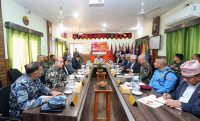National
Why the MCC compact courted controversy in Nepal
Politicians are divided over the Millennium Challenge Corporation’s links with the US’ Indo-Pacific Strategy and provisions that say the agreement will prevail over Nepal’s laws in case of conflicts.
Binod Ghimire
During the recently concluded Standing Committee meeting of the ruling Nepal Communist Party, leaders appeared sharply divided over whether the federal parliament should ratify the United States’ Millennium Challenge Corporation’s Nepal Compact. A section of party leaders strongly stood against parliamentary ratification of the compact, arguing that the MCC is part of Washington’s Indo-Pacific Strategy, which has military components that are aimed at countering China, a friendly neighbour. They have opposed the compact’s requirement of House approval, as the compact says that it would prevail over Nepal’s existing laws in case of conflicts.
However, another section of the ruling party, led by Prime Minister KP Sharma Oli, has lobbied in favour for the compact and wants the ongoing session of the House of Representatives to ratify it. The primary opposition Nepali Congress too has argued that the agreement be approved without any delay.
Here’s everything you need to know about the MCC and the debate surrounding it.
What is the MCC?
The US Congress, in 2004, approved legislation for the establishment of the MCC as an independent bilateral foreign aid agency. The MCC was formed following dissatisfaction with the US’ other foreign aid programmes, with an objective to reduce poverty through economic growth. Assistance under the MCC is given to low-income and lower-middle-income countries selected through competition. A report by the Congressional Research Centre says that the MCC is based on the premise that economic development cannot succeed unless it is linked to free market policies and democratic principles. Since its inception, the MCC Board has approved 37 compacts worth $13 billion for 29 countries, as of 2019.
Only countries that demonstrate commitments to good governance have positive development returns and take ownership of the programme are eligible for MCC grants. Any country willing to receive the grant must have 10 of 20 indicators, ranging from proper business conditions for start-ups and environments conducive to child health and civil liberties to the status of political rights and funding for education. The grant is allotted for agriculture and irrigation, education, anti-corruption measures, power and energy, enterprise development, health, transportation, land rights and sanitation, and water supply.
When was the MCC Nepal compact signed?
Nepal was the first country in South Asia to qualify for the compact after it met 16 out of the 20 policy indicators. Then joint-secretary Baikuntha Aryal and Jonathan Nash, acting chief executive officer of the MCC, in September 2017 signed an agreement in the presence of then-minister for finance Gyandera Bahadur Karki and US Deputy Secretary of State John J Sullivan in Washington. The US government agreed to provide $500 million in grants while Nepal would put in $130 million for the project that prioritises energy and roadways. This is the largest grant Nepal has ever received.
As per the deal, the funds will be spent on setting up a 400KV transmission line running 400 kilometres on the Lapsiphedi-Galchhi-Damauli-Sunawal power corridor. The funds will also be used to set up three substations en route to infrastructure that will connect to the cross-border transmission line with India in Rupandehi. Some $130 million under the MCC compact will go towards the maintenance of around 300 kilometres of roads on the East-West Highway.
.jpg)
What is the dispute all about?
Finance Minister Yubaraj Khatiwada, in July last year, registered the compact at the federal parliament for ratification. However, it was never presented before the House for approval. Though the dispute has only surfaced recently, a section of the Nepal Communist Party, including its chief whip Dev Gurung, had been lobbying former Speaker Krishna Bahadur Mahara to not prioritise the compact for ratification.
Oli and his ministers, however, claim that the compact will be ratified by the ongoing winter session of Parliament. In an interview with Kantipur daily, the Post’s sister publication, on October 19, Oli had blamed Mahara for delaying the ratification process.
There wasn’t much dispute over the compact until David J Ranz, assistant secretary for South Asia at the US State Department, during his Nepal visit in May last year said that the MCC was a crucial part of the Indo-Pacific Strategy. Dissenting leaders within the ruling party have demanded that the government clarify if the MCC is a part of the US strategy. Referring to statements from US officials, politicians have said that Foreign Minister Pradeep Gyawali lied to them when he said, on December 26, that the deal was not a part of the IPS. The Standing Committee meeting of the ruling party last month was unable to decide on ratification following sharp criticism from its members.
What is the Nepal government’s position?
Foreign Minister Gyawali has repeatedly denied that the MCC Nepal compact talks about the IPS. He said there was nothing to worry about as the implementation of projects under the MCC would be guided solely by the compact. The Nepali Congress, under whose leadership the compact was first signed, holds the same position. The Congress maintains that the government has to abide by the agreement, which doesn’t talk about the IPS, regardless of what officials, even from the US, say. The Congress has asked the government to prioritise the compact for ratification this House session, extending its cooperation in the process. Opposition leaders have even warned that it would be “suicidal” for Nepal if the House rejects the compact as it would have lasting consequences for the Nepal-US diplomatic relationship. There are several instances of the US partially or fully terminating compacts for various reasons. The compacts for Madagascar and Mali were terminated fully while those in Nicaragua and Honduras were partially withdrawn. In Mali, the termination followed the late-March military coup.
Is MCC a part of the Indo-Pacific Strategy?
The Indo-Pacific Strategy Report, published in June last year, says that the strategy broadly envisions linkages between security, governance and economics. Though it doesn’t talk about the MCC, another report that came out two months ago clearly says that support under the compact is a part of the IPS. According to an expert who has worked for the Millenium Challenge Account, the Nepal office of the MCC, Nepal should consider the MCC as an economic part of the IPS. Ratifying the MCC doesn’t necessarily mean being a part of a “military alliance”. Economists suggest that Nepal should accept any economic support and there is no harm for the country in endorsing the MCC. Even Chinese Ambassador to Nepal Hou Yanqi has said that Beijing welcomes any international assistance to Nepal if it is for economic cooperation.
Why should a foreign assistance programme require parliamentary ratification?
The MCC compact doesn’t say it needs to be ratified by Nepal’s parliament. However, the text of the agreement says that provisions in the compact will prevail over Nepal’s existing laws in case of conflicts, which requires parliamentary ratification, according to the Nepal Treaty Act. The MCC is the first grant agreement that requires parliamentary approval. However, it is also the largest grant agreement Nepal has ever signed.
As the grant assistance under the MCC has to be approved by the US Congress, the United States government looks for the same level of commitment from receiving countries. Therefore, most countries ratify the MCC compact through their parliament. However, their agreements don't say the provisions in the compact would prevail over the domestic laws in case of contraction, according to the expert who formerly worked for the MCA.




 9.17°C Kathmandu
9.17°C Kathmandu













